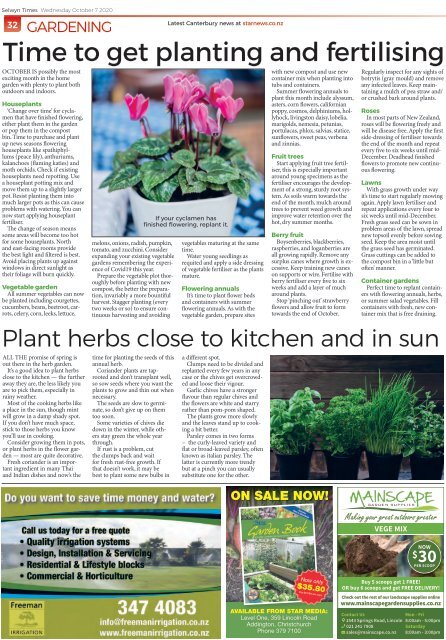Selwyn Times: October 07, 2020
Create successful ePaper yourself
Turn your PDF publications into a flip-book with our unique Google optimized e-Paper software.
<strong>Selwyn</strong> <strong>Times</strong> Wednesday <strong>October</strong> 7 <strong>2020</strong><br />
32<br />
GARDENING<br />
Latest Canterbury news at starnews.co.nz<br />
Time to get planting and fertilising<br />
OCTOBER IS possibly the most<br />
exciting month in the home<br />
garden with plenty to plant both<br />
outdoors and indoors.<br />
Houseplants<br />
‘Change over time’ for cyclamen<br />
that have finished flowering,<br />
either plant them in the garden<br />
or pop them in the compost<br />
bin. Time to purchase and plant<br />
up news seasons flowering<br />
houseplants like spathiphyllums<br />
(peace lily), anthuriums,<br />
kalanchoes (flaming katies) and<br />
moth orchids. Check if existing<br />
houseplants need repotting. Use<br />
a houseplant potting mix and<br />
move them up to a slightly larger<br />
pot. Resist planting them into<br />
much larger pots as this can cause<br />
problems with watering. You can<br />
now start applying houseplant<br />
fertiliser.<br />
The change of season means<br />
some areas will become too hot<br />
for some houseplants. North<br />
and east-facing rooms provide<br />
the best light and filtered is best.<br />
Avoid placing plants up against<br />
windows in direct sunlight as<br />
their foliage will burn quickly.<br />
Vegetable garden<br />
All summer vegetables can now<br />
be planted including courgettes,<br />
cucumbers, beans, beetroot, carrots,<br />
celery, corn, leeks, lettuce,<br />
melons, onions, radish, pumpkin,<br />
tomato, and zucchini. Consider<br />
expanding your existing vegetable<br />
gardens remembering the experience<br />
of Covid19 this year.<br />
Prepare the vegetable plot thoroughly<br />
before planting with new<br />
compost, the better the preparation,<br />
invariably a more bountiful<br />
harvest. Stagger planting (every<br />
two weeks or so) to ensure continuous<br />
harvesting and avoiding<br />
If your cyclamen has<br />
finished flowering, replant it.<br />
vegetables maturing at the same<br />
time.<br />
Water young seedlings as<br />
requited and apply a side dressing<br />
of vegetable fertiliser as the plants<br />
mature.<br />
Flowering annuals<br />
It’s time to plant flower beds<br />
and containers with summer<br />
flowering annuals. As with the<br />
vegetable garden, prepare sites<br />
with new compost and use new<br />
container mix when planting into<br />
tubs and containers.<br />
Summer flowering annuals to<br />
plant this month include alyssum,<br />
asters, corn flowers, californian<br />
poppy, cosmos, delphiniums, hollyhock,<br />
livingston daisy, lobelia,<br />
marigolds, nemesia, petunias,<br />
portulacas, phlox, salvias, statice,<br />
sunflowers, sweet peas, verbena<br />
and zinnias.<br />
Fruit trees<br />
Start applying fruit tree fertiliser,<br />
this is especially important<br />
around young specimens as the<br />
fertiliser encourages the development<br />
of a strong, sturdy root system.<br />
As soils warm towards the<br />
end of the month, mulch around<br />
trees to prevent weed growth and<br />
improve water retention over the<br />
hot, dry summer months.<br />
Berry fruit<br />
Boysenberries, blackberries,<br />
raspberries, and loganberries are<br />
all growing rapidly. Remove any<br />
surplus canes where growth is excessive.<br />
Keep training new canes<br />
on supports or wire. Fertilise with<br />
berry fertiliser every five to six<br />
weeks and add a layer of much<br />
around plants.<br />
Stop ‘pinching out’ strawberry<br />
flowers and allow fruit to form<br />
towards the end of <strong>October</strong>.<br />
Regularly inspect for any sights of<br />
botrytis (gray mould) and remove<br />
any infected leaves. Keep maintaining<br />
a mulch of pea straw and/<br />
or crushed bark around plants.<br />
Roses<br />
In most parts of New Zealand,<br />
roses will be flowering freely and<br />
will be disease free. Apply the first<br />
side-dressing of fertiliser towards<br />
the end of the month and repeat<br />
every five to six weeks until mid-<br />
December. Deadhead finished<br />
flowers to promote new continuous<br />
flowering.<br />
Lawns<br />
With grass growth under way<br />
it’s time to start regularly mowing<br />
again. Apply lawn fertiliser and<br />
repeat applications every four to<br />
six weeks until mid-December.<br />
Fresh grass seed can be sown in<br />
problem areas of the lawn, spread<br />
new topsoil evenly before sowing<br />
seed. Keep the area moist until<br />
the grass seed has germinated.<br />
Grass cuttings can be added to<br />
the compost bin in a ‘little but<br />
often’ manner.<br />
Container gardens<br />
Perfect time to replant containers<br />
with flowering annuals, herbs,<br />
or summer salad vegetables. Fill<br />
containers with fresh, new container<br />
mix that is free draining.<br />
Plant herbs close to kitchen and in sun<br />
ALL THE promise of spring is<br />
out there in the herb garden.<br />
It’s a good idea to plant herbs<br />
close to the kitchen — the further<br />
away they are, the less likely you<br />
are to pick them, especially in<br />
rainy weather.<br />
Most of the cooking herbs like<br />
a place in the sun, though mint<br />
will grow in a damp shady spot.<br />
If you don’t have much space,<br />
stick to those herbs you know<br />
you’ll use in cooking.<br />
Consider growing them in pots,<br />
or plant herbs in the flower garden<br />
— most are quite decorative.<br />
Fresh coriander is an important<br />
ingredient in many Thai<br />
and Indian dishes and now’s the<br />
time for planting the seeds of this<br />
annual herb.<br />
Coriander plants are taprooted<br />
and don’t transplant well,<br />
so sow seeds where you want the<br />
plants to grow and thin out when<br />
necessary.<br />
The seeds are slow to germinate,<br />
so don’t give up on them<br />
too soon.<br />
Some varieties of chives die<br />
down in the winter, while others<br />
stay green the whole year<br />
through.<br />
If rust is a problem, cut<br />
the clumps back and wait<br />
for fresh rust-free growth. If<br />
that doesn’t work, it may be<br />
best to plant some new bulbs in<br />
a different spot.<br />
Clumps need to be divided and<br />
replanted every few years in any<br />
case or the chives get overcrowded<br />
and loose their vigour.<br />
Garlic chives have a stronger<br />
flavour than regular chives and<br />
the flowers are white and starry<br />
rather than pom-pom shaped.<br />
The plants grow more slowly<br />
and the leaves stand up to cooking<br />
a bit better.<br />
Parsley comes in two forms<br />
– the curly-leaved variety and<br />
flat or broad-leaved parsley, often<br />
known as italian parsley. The<br />
latter is currently more trendy<br />
but at a pinch you can usually<br />
substitute one for the other.<br />
oN sAle Now!<br />
Making your great outdoors greater<br />
Vege Mix<br />
NOW<br />
$30<br />
PeR SCOOP<br />
Now only<br />
$35.80<br />
Plus $5 P&H per copy<br />
AvAilAble from stAr mediA:<br />
Level One, 359 Lincoln Road<br />
Addington, Christchurch<br />
Phone 379 7100<br />
Buy 5 scoops get 1 FRee!<br />
OR buy 6 scoops and get FRee DeLiVeRY!<br />
Check out the rest of our landscape supplies online<br />
www.mainscapegardensupplies.co.nz<br />
Contact Us<br />
1543 Springs Road, Lincoln<br />
021 241 7908<br />
sales@mainscape.co.nz<br />
Mon - Fri<br />
8:00am - 5:00pm<br />
Saturday<br />
8:00am - 3:00pm


















